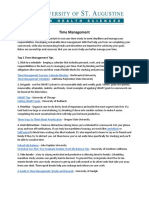0% found this document useful (0 votes)
7 views1 pageTime Management Tips
This guide outlines effective time management strategies for students and professionals, emphasizing the importance of prioritizing tasks, planning daily activities, and avoiding multitasking. It suggests using tools like the Eisenhower Matrix and SMART goals to enhance productivity. Regular reflection and adjustment of schedules are encouraged to improve efficiency and reduce stress.
Uploaded by
silviuCopyright
© © All Rights Reserved
We take content rights seriously. If you suspect this is your content, claim it here.
Available Formats
Download as TXT, PDF, TXT or read online on Scribd
0% found this document useful (0 votes)
7 views1 pageTime Management Tips
This guide outlines effective time management strategies for students and professionals, emphasizing the importance of prioritizing tasks, planning daily activities, and avoiding multitasking. It suggests using tools like the Eisenhower Matrix and SMART goals to enhance productivity. Regular reflection and adjustment of schedules are encouraged to improve efficiency and reduce stress.
Uploaded by
silviuCopyright
© © All Rights Reserved
We take content rights seriously. If you suspect this is your content, claim it here.
Available Formats
Download as TXT, PDF, TXT or read online on Scribd
/ 1


























































